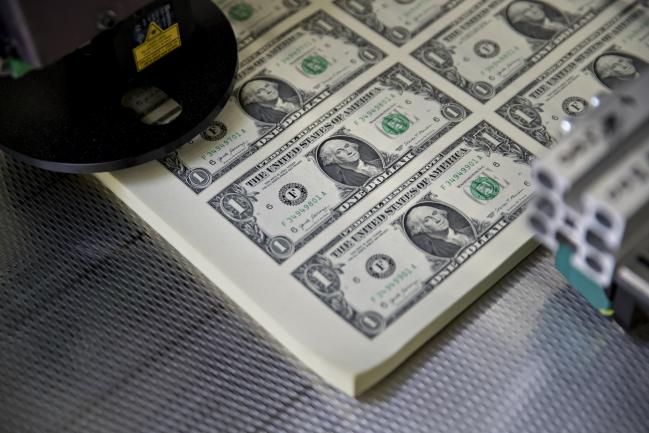(Bloomberg) -- The Federal Reserve’s big surprise could spell disaster for dollar bulls.
The Bloomberg dollar index tumbled 0.5 percent on Wednesday, making it the worst day since January, after Fed policy makers unexpectedly signaled they’d hold their rates benchmark steady all year because of troubling signs from the economy. Among other problems, that could undermine the currency’s appeal by cutting into any yield advantage on dollar-denominated assets.
Some investors and economists were caught off guard by the extent of dovishness in the statement. The Fed’s shift comes a week after hedge funds and speculators boosted bets that the greenback would outperform peers to the highest level since January.
Before Wednesday, “we were mildly bullish with the intention of flipping as soon as the Fed signaled that it was done tightening through QE and rate hikes,” said Greg Anderson, global head of foreign-exchange strategy at BMO. “The Fed dropped those hints a whole lot faster than we thought.”
As 2019 began, dollar bears proclaimed that the Fed would stop or slow interest-rate hikes, U.S. growth rates wouldn’t be able to consistently outperform the rest of the world, and the advantage an investor gets from holding greenbacks would diminish. But the currency generally remained buoyant. The Bloomberg dollar index rose about 7 percent through Tuesday’s close from a three-year low in February 2018. Then came Wednesday and the revised dot plot -- the chart Fed policy makers use to convey their rate forecasts.
“The dots are dinging the dollar,” said Mark McCormick (NYSE:MKC), a foreign-exchange strategist at TD Securities. It strengthens the “bearish” case for the greenback, he added.
The Fed’s new stance “partially” vindicates the bears, but for the dollar to weaken more, economies outside the U.S. will need to perk up, according to Bipan Rai of Canadian Imperial Bank of Commerce.
“The key ingredient to ensure that the USD sells off consistently is a pick-up in the fundamental story for the euro zone,” said Rai, the head of North American foreign-exchange strategy at CIBC. “We’re seeing some nascent signs there, but we need more evidence -- especially in Germany.”
BNY Mellon also argues a dovish Fed may not doom the dollar, as central banks all over the world move toward the same direction, FX strategist John Velis wrote in a note.
“One would be tempted to think that this still-more-dovish turn by the Fed will take DXY down, but then again, that prediction would have been sensible in January after the Fed’s pause was announced,” he said. “It didn’t happen then, and it might not happen now.”
(Adds BNY view in last two paragraphs, small changes throughout.)
